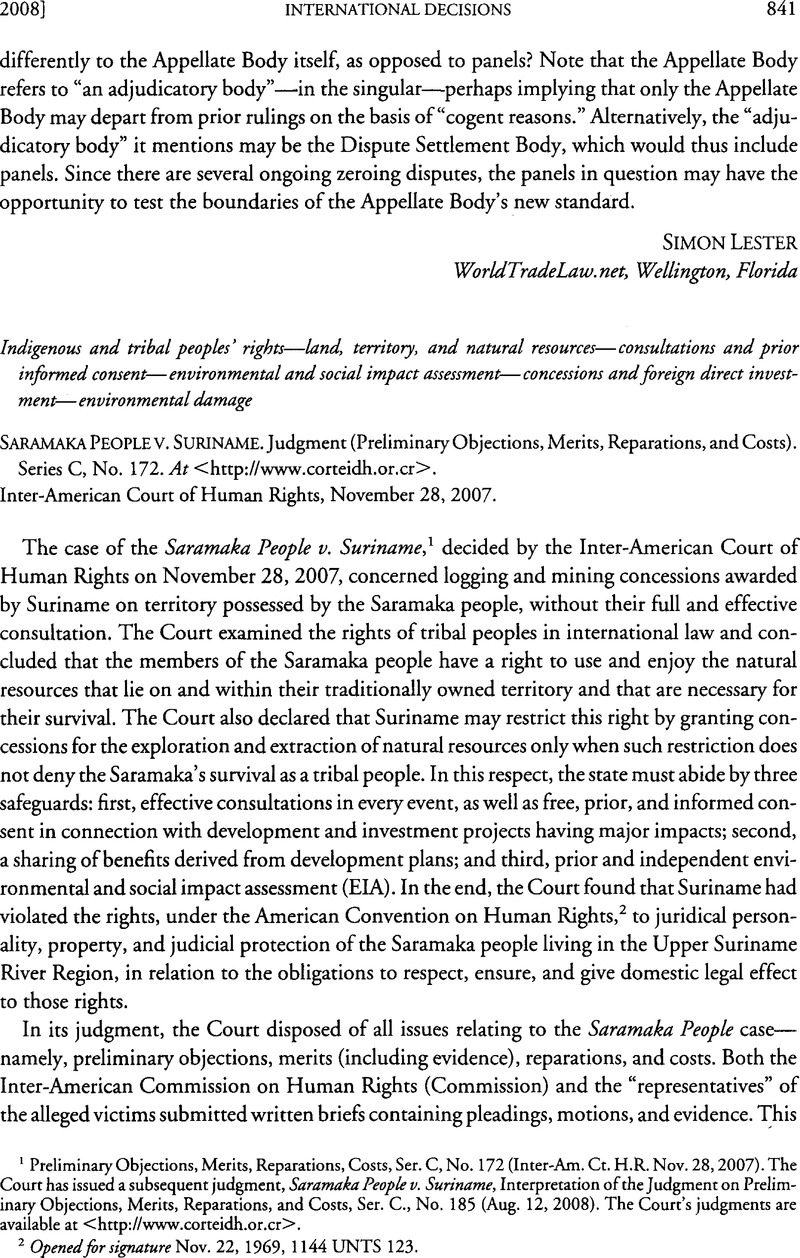Article contents
Saramaka People V. Suriname. Judgment (Preliminary Objections, Merits, Reparations, and Costs)
Published online by Cambridge University Press: 27 February 2017
Abstract

- Type
- International Decisions
- Information
- Copyright
- Copyright © American Society of International Law 2008
References
1 Preliminary Objections, Merits, Reparations, Costs, Ser. C, No. 172 (Inter-Am. Ct. H.R. Nov. 28,2007). The Court has issued a subsequent judgment, Saramaka People v. Suriname, Interpretation of the Judgment on Preliminary Objections, Merits, Reparations, and Costs, Ser. C , No. 185 (Aug. 12, 2008). The Court’s judgments are available at <http://www.corteidh.or.cr>.
2 Opened for signature Nov. 22, 1969, 1144 UNTS 123.
3 Namely, the Association of Saramaka Authorities and the twelve Saramaka captains.
4 One submission was a “shadow report” to the Human Rights Committee on Suriname’s compliance with the International Covenant on Civil and Political Rights, Dec. 16, 1966, 999 UNTS 171 [hereinafter ICCPR]; other submissions were to the CERD’s “early warning measures and urgent action procedure.”
5 “[Article 29(b)] prohibits an interpretation of any provision of the Convention in a manner that restricts its enjoyment to a lesser degree than what is recognized in the domestic laws of the State in question or in another treaty to which the State is a party” (para. 92).
6 June 27, 1989, 28 ILM 1382, at <http://www.ilo.org>..>Google Scholar
7 See supra note 4.
8 Dec. 16, 1966, 999 UNTS 3. Common Article 1 refers to the right of self-determination, and ICCPR Article 27 refers to the right to culture.
9 Common Article 1 of both Covenants has been interpreted as applying to indigenous peoples; accordingly, by virtue of their right of self-determination, they may freely pursue their economic, social, and cultural development and may freely dispose of their natural wealth and resources so as not to be deprived of their own means of subsistence. Similarly, under Article 27 of the ICCPR, the UN Human Rights Committee has observed that “minorities shall not be denied the right, in community with the other members of their group, to enjoy their own culture, which may consist in a way of life which is closely associated with territory and use of its resources” (para. 94, quoting UN Human Rights Committee, General Comment No. 23, The Rights of Minorities, UN Doc. CCPR/C/21Rev.l/ Add.5 (1994)).
10 Citing Indigenous Cmty. YakyeAxa v. Paraguay, Merits, Reparations, Costs, Ser. C, No. 125 (Inter-Am. Ct. H.R June 17,2005), and Indigenous Cmty. Sawhoyamaxa v. Paraguay, Merits, Reparations, Costs, Ser. C, No. 146 (Inter-Am. Ct. H.R. Mar. 29, 2006).
11 The restriction must (1) have been previously established by law; (2) be necessary; (3) be proportional, and (4) have the aim of achieving a legitimate objective in a democratic society (paras. 127–28).
12 See World Duty Free Co. v. Republic of Kenya, ICSID Case No. ARB/00/7, Award (Oct. 4, 2006).
13 See Michael, Bowman & Alan, Boyle Environmental Damage In International And Comparative Law: Problems Of Definition And Valuation (2002)Google Scholar.
- 7
- Cited by




